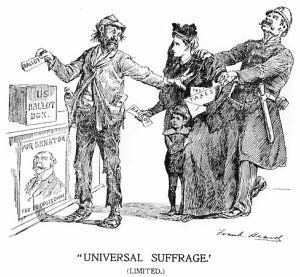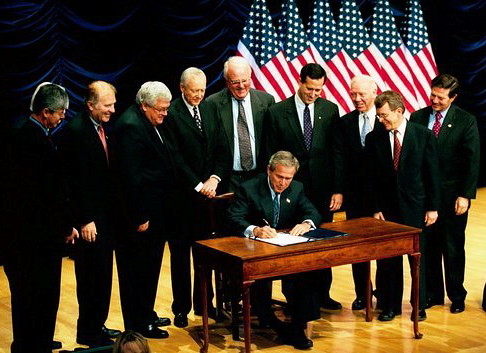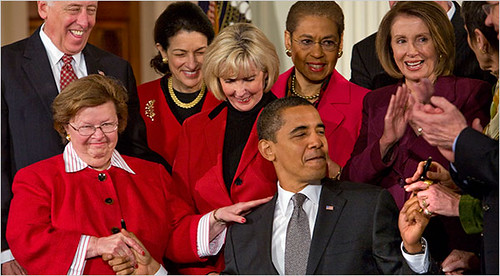Happy 90th birthday, 19th Amendment.
This is a bittersweet anniversary mostly because it was so unnecessary. It's not that the women's rights movement didn't do amazing things in the face of overwhelming opposition. They did and continue to do so.
Women like Susan B. Anthony, Alice Paul and Elizabeth Cady Stanton had to fight against religious rhetoric, misinterpretations of science, fears of other political agendas, unfounded anxiety about the break down of society and socialism.
Sounds familiar, right?
 It should sound familiar. Here is the detestable Ann Coulter discussing women's suffrage in 2007:
It should sound familiar. Here is the detestable Ann Coulter discussing women's suffrage in 2007:
If we took away women’s right to vote, we’d never have to worry about another Democrat president. It’s kind of a pipe dream, it’s a personal fantasy of mine, but I don’t think it’s going to happen. And it is a good way of making the point that women are voting so stupidly, at least single women.
And here is a story about The National Reviews' John Derbyshire making the same argument.
Pathetic.
The original Constitution and Bill of Rights are silent on the issue of suffrage. This was not an oversight, either. During the Constitutional Convention, the delegates (men all) debated a uniform qualification based on property owned. To wit:
Mr. RUTLIDGE
seconded the motion; observing that the Committee had reported no qualifications because they could not agree on any among themselves, being embarrassed by the danger on one side of displeasing the people by making them high, and on the other of rendering them nugatory by making them low.
In other words, the committee that considered the suffrage question could not form a consensus on federal suffrage qualifications. On one hand, a property requirement would mean that Congress would always have an aristocratic flavor because rich people would vote for other rich people. A lack of a property requirement would mean that a lot of poor people would vote for other poor, uneducated people.
If only the Framers could have foreseen modern campaign contributions.
Consequentially, the states have always decided who may and may not vote, thus influencing the types of politicians who get elected. Click here to see how excluding certain people from the electorate influences elections.
The upshot is that the states got to set their own voting qualifications and the federal government rarely steps in. New Jersey women voted for George Washington twice as well as the two elections that Thomas Jefferson won, though Jefferson lost New Jersey in 1800.
New Jersey women lost their right to vote in 1807. Ten years earlier, a female voting bloc almost defeated the man who sponsored the resolution revoking the franchise to women.
As a result, women had to fight for the franchise state by state and territory by territory. The history of the movement is well documented.

Photo source.
Over the next 113 years, the anti-suffrage side built their arguments that are so painfully familiar today. It's interesting to review some of those arguments in order to understand what the reactionary right is doing today.
You can't handle the franchise:
As late as 1917, Minnesota state Rep. Thomas Girling declared that, "women shouldn't be dragged into the dirty pool of politics." Some antis fretted that women would get hurt in the chaos that was 19th century polling.
Like Alice Paul was some kind of delicate flower.
With the nation now at war, women carried banners that cried, "Kaiser Wilson...how long must women wait for liberty?" Paul and many other demonstrators were arrested on bogus charges, imprisoned in the Occoquan Workhouse in Virginia, straitjacketed and force-fed when Paul led an in-prison hunger strike.
{I should note that Alice Paul rejected the state-by-state strategy, arguing for a constitutional amendment to enfranchise women just like African American men.}
President Howard Taft weighed in with this shocking quote:
On the whole it is fair to say that the immediate enfranchisement of women will increase the proportion of the hysterical element of the electorate.
Then there was Mark Twain:
I think I could write a pretty strong argument in favor of female suffrage, but I do not want to do it. I never want to see the women voting, and gabbling about politics, and electioneering. There is something revolting in the thought. It would shock me inexpressibly for an angel to come down from above and ask me to take a drink with him (though I should doubtless consent); but it would shock me still more to see one of our blessed earthly angels peddling election tickets among a mob of shabby scoundrels she never saw before.
- Letter to St. Louis Missouri Democrat, March 1867
Happily, he changed his position later in life.
I know that since the women started out on their crusade they have scored in every project they undertook against unjust laws. I would like to see them help make the laws and those who are to enforce them. I would like to see the whiplash in women's hands.
- quoted in The New York Times, January 21, 1901
God said so
In the Christian myth, Eve ate some fruit. She offered it to Adam. He ate the fruit. It tasted good. God got more pissed at Eve than Adam for reasons beyond rational comprehension. Then he permabanned them from Eden and made women bear children.
Therefore, men are more equal than women.
It makes perfect sense once you suspend rational thought.
A woman's place is in the House (and Senate)
One argument that flows from the first two premises is that women's suffrage would destroy domestic tranquility. Perhaps they were willfully blind to the fact that the casual acceptance of male domination of society was more to blame for domestic violence than any political argument.
![suffragettes[1]](http://farm5.static.flickr.com/4137/4906090560_4d368d65a2.jpg)
In a husband-wife voting bloc, there are only four outcomes. Either they vote the same way, vote differently, only one votes, or neither vote. The idea was that most women would vote the same as their husbands, doubling the number of ballots cast for the same outcome. On the other hand, husbands might beat their wives for holding different political views. Of course, this is a classic case of curing the symptom by cutting off the patient's nose.
Internal opposition
The suffragists also saw dissent from presumably natural allies -- educated women. An interesting dichotomy comes from siblings Henry Ward Beecher and Catharine Beecher (both siblings to Harriet Beecher Stowe).
Henry:
He was one of the leaders in the movement known as Romantic Christianity, preaching not the harsh judgment of God, as had his ancestors, but rather the loving presence of God. He also espoused the concept of the freedom of the individual with a social conscience, a cornerstone of Congregational belief. After the (Civil) (W)ar, Beecher championed such causes as women's suffrage, temperance, and evolution, and he spoke out against anti-Semitism.
Catharine:
Catharine Beecher not only did not join her sisters in support of the suffrage movement, but even wrote against it in The True Remedy for the Wrongs of Women and Woman Suffrage and Woman’s Profession (1871). She was far too conservative to have ever endorsed the ordination of women into the clergy, but she probably was aware at some deeper level that had she been a boy, she would have joined her brothers in the clergy. Because she could not do that, she sublimated the energy that propelled her and became an unofficial preacher to women. Her books preached a moralistic, even anti-modern, message; she advocated self-sacrifice, modesty, and frugality along with hints on baby care and cooking. She portrayed home and school as omnipotent societal forces, so important that women should limit their lives to them.
Catharine was an important thinker and educator in her own right.
Most 19th-century girls expected to marry and manage homes, and many felt they needed little formal education. Catharine argued that running a home was as complicated as running a business, and that young women should be instructed in these responsibilities the same way boys received instruction in their careers. Using her own life as an example, Catharine Beecher also wanted to prepare young women for the future and train them to become teachers.
So the pro-suffrage advocates faced significant opposition from other women. It was easy enough for the misogynists to point to people like Catharine Beecher and say, "even women don't want the vote."
Other political goals
Obviously, women did not push for the franchise simply for the sake of getting the vote. They had agendas. Some suffragists wanted to end slavery. The horror, I know. Unfortunately, as long as the suffrage movement allied itself with abolition, neither would happen in the antebellum period. The various compromises ensured that the Senate stayed 50 percent slave, 50 percent free. Therefore, there was no legislative remedy.
Others wanted to improve working conditions for women and children and prevent a tragedy like the Triangle Shirtwaist Fire. Of course, any government regulation equals socialism to the right wingers even if those regulations would save lives of women and children.
h/t to dsteffan for the series on regulations.
You read that correctly. Women would vote for a vision of a socialistic hell hole like Sweden.
And the 900 pound gorilla in the room was alcohol prohibition. As long as the suffrage and prohibition movements stayed closely tied, advocates fought an uphill battle against saloon owners, brewers and just plain alcoholic, abusive jerks. Oh, and the responsible drinkers who didn't want to suffer for the excesses of others. Prohibition did not work, but at least it passed democratically.
End Game
We owe a lot of gratitude to Febb Ensminger Burn, mother of Tennessee state Rep. Harry Burn, who changed his stance during Tennessee's war of the roses, cast the deciding vote in the state legislature for suffrage and ultimately added the 19th Amendment to the Constitution. Mom sent this letter to her boy, the state legislator:
Dear Son:
Hurrah, and vote for suffrage! Don’t keep them in doubt. I notice some of the speeches against. They were bitter. I have been watching to see how you stood, but have not noticed anything yet.
Don’t forget to be a good boy and help Mrs. Catt put the "rat" in ratification.
Your Mother.
Simple. Elegant. Successful. Mom usually does know best.
The Mrs. Catt was Carrie Chapman Catt.
So there it is. The right wing is still recycling old talking points in an effort to recreate that "wonderful" time when only rich, white men could vote and thus control the government.
And if you don't think the modern GOP still has an underlying classist and patriarchal streak, check out these two photos, with a major hat tip to Feministe:
This picture is George W. Bush signing the partial birth abortion ban:

And here's Barack Obama signing the Lilly Ledbetter Fair Pay Act:

I know which vision of America I prefer.
Recommended reading: Alexander Keyssar. The Right to Vote: The Contested History of Democracy in the United States. New York: BasicBooks. 2000.
Crossposted on Progressive Electorate


